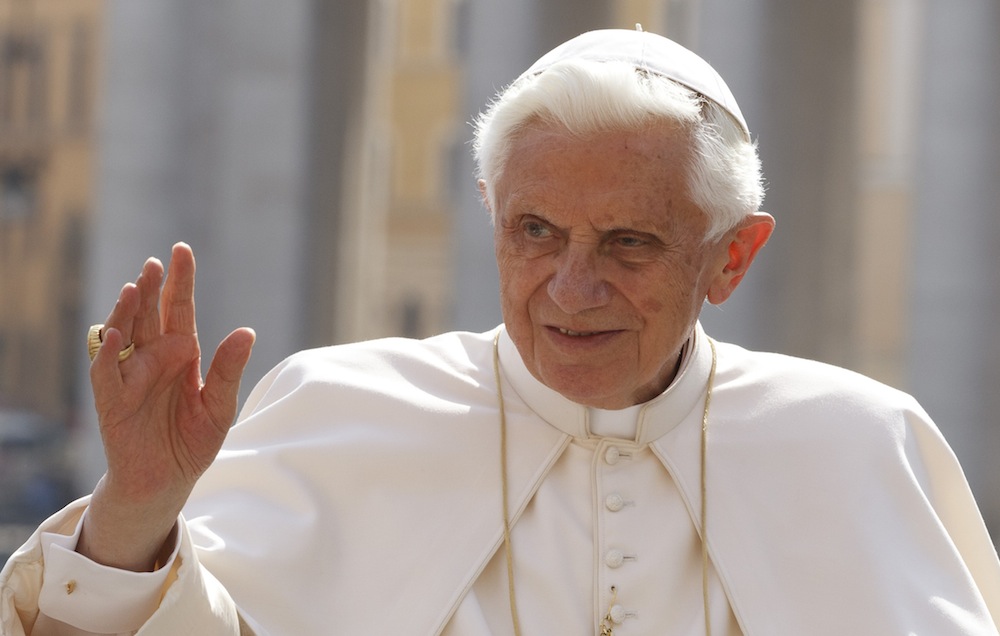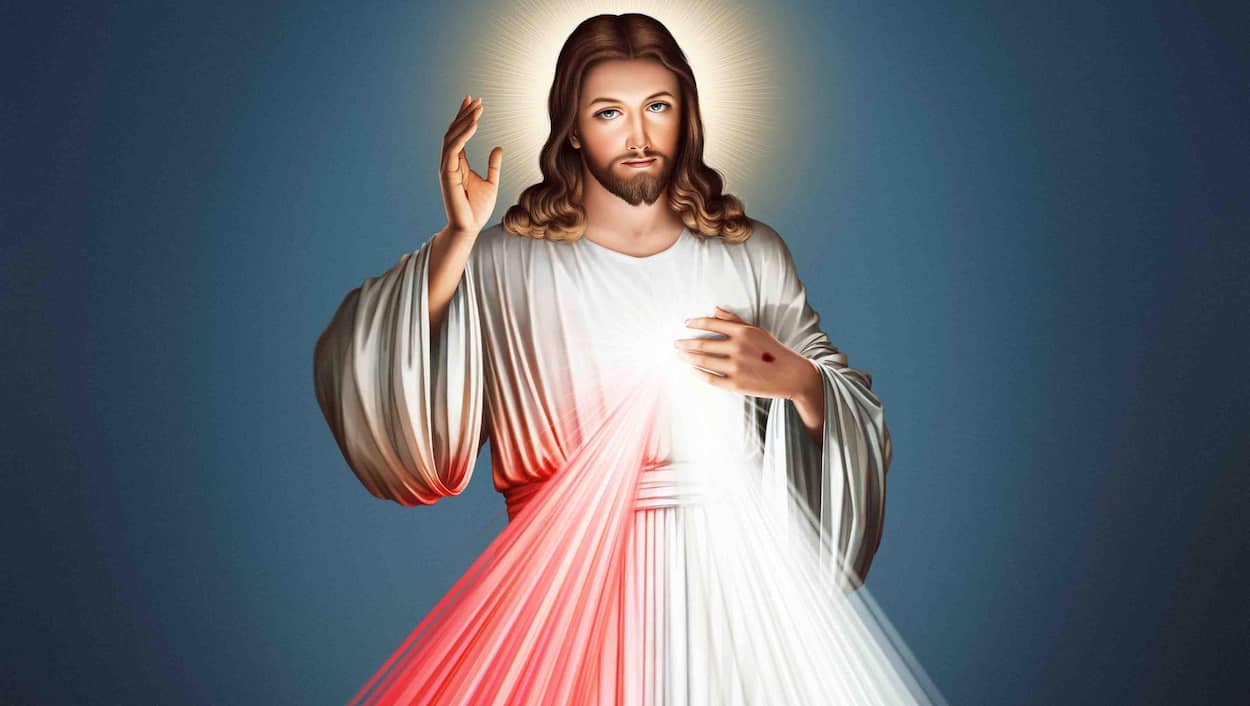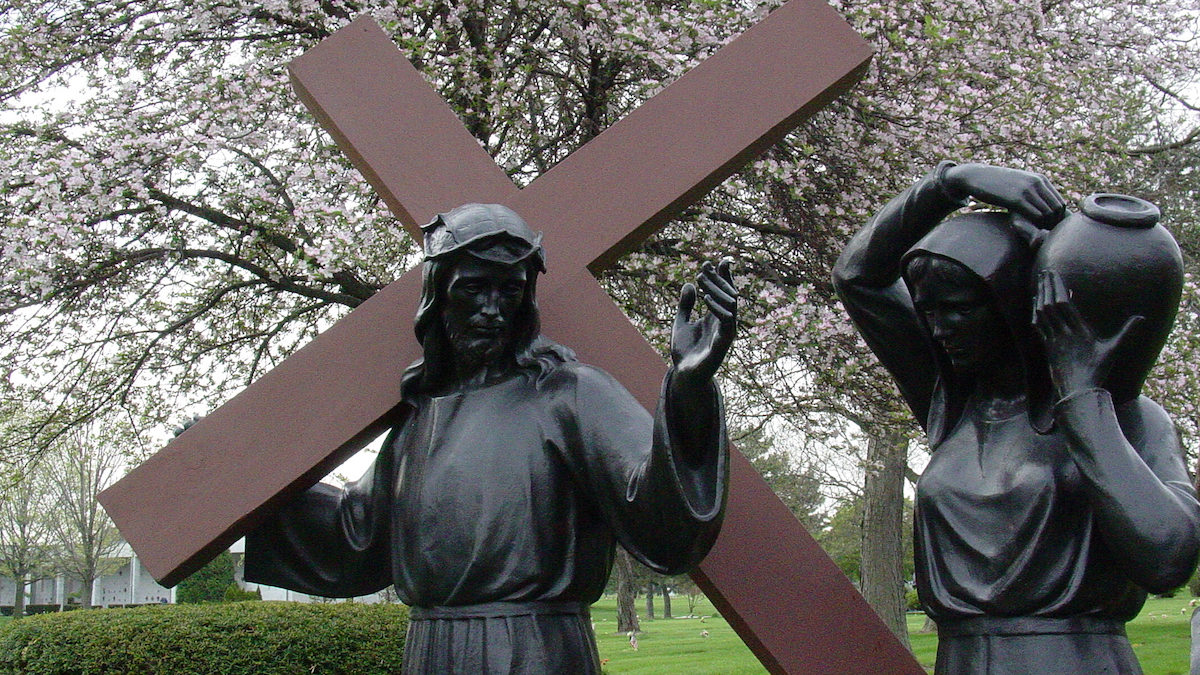Pope Benedict XVI’s pontificate has been marked by the Divine Mercy message. In fact, this fundamental message took a prominent place in his speeches. It is interesting to glance at some of the many references he made to the Divine Mercy so as to appreciate the power of God’s merciful heart for us.
For the German Pope, Divine Mercy means God’s loving and guiding accompaniment of his flock, the Church, particularly by providing shepherds to tend and lead it to the eternal pastures. In his first message as Pope, precisely on April 20, 2005, Benedict said:
At this time, side by side in my heart, I feel two contrasting emotions. On the one hand, a sense of inadequacy and human apprehension as I face the responsibility for the universal Church, entrusted to me yesterday as Successor of the Apostle Peter in this See of Rome. On the other, I have a lively feeling of profound gratitude to God who, as the liturgy makes us sing, never leaves his flock untended but leads it down the ages under the guidance of those whom he himself has chosen as the Vicars of his Son and has made shepherds of the flock (cf. Preface of Apostles I). Dear friends, this deep gratitude for a gift of Divine Mercy is uppermost in my heart in spite of all. And I consider it a special grace which my Venerable Predecessor, John Paul II, has obtained for me. I seem to feel his strong hand clasping mine; I seem to see his smiling eyes and hear his words, at this moment addressed specifically to me, “Do not be afraid!”
As in Pope Saint John Paul II’s understanding, Pope Benedict regarded the Divine Mercy as central to Christian faith and its liturgical expression. In his Regina Caeli Address for Divine Mercy of Sunday April 23, 2006, he said:
The Servant of God John Paul II … wanted the Sunday after Easter to be dedicated in a special way to Divine Mercy, and providence disposed that he should die precisely on the vigil of that day (in the hands of Divine Mercy). The mystery of the merciful love of God was at the center of the pontificate of my venerated predecessor. Let us recall, in particular, the encyclical Dives in Misericordia of 1980, and the dedication of the new shrine of Divine Mercy in Krakow, in 2002. The words he pronounced on that last occasion were as a synthesis of his magisterium, evidencing that devotion to Divine Mercy is not a secondary devotion, but an integral dimension of a Christian’s faith and prayer.
Moreover, for Benedict XVI, Divine Mercy embraces human suffering and transforms it into its transformative power. The transformative result of this most intimate union between the sick person and Christ results is that the transformed person becomes an eloquent testimony of God’s mercy for others. This the core of the message he gave to the sick people at the Shrine of Divine Mercy in Krakow-Lagiewniki on May 27, 2006:
On this occasion we encounter two mysteries: the mystery of human suffering and the mystery of Divine Mercy. At first sight these two mysteries seem to be opposed to one another. But when we study them more deeply in the light of faith, we find that they are placed in reciprocal harmony through the mystery of the Cross of Christ. As Pope John Paul II said in this place: “The Cross is the most profound bowing down of the Divinity towards man … the Cross is like a touch of eternal love on the most painful wounds of humanity’s earthly existence” (August 17, 2002).
Dear friends who are sick, who are marked by suffering in body or soul, you are most closely united to the Cross of Christ, and at the same time, you are the most eloquent witnesses of God’s mercy. Through you and through your suffering, he bows down toward humanity with love. You who say in silence: “Jesus, I trust in you,” teach us that there is no faith more profound, no hope more alive and no love more ardent than the faith, hope and love of a person who in the midst of suffering places himself securely in God’s hands.
In Pope Benedict XIV’s theological reflection, Divine Mercy enlightens the mystery of humanity. It is solely God’s mercy which is God’s very energy as well as His divine restraint of evil in our fallen world. We find this point well expressed in his General Audience on May 31, 2006, right after his pilgrimage to Poland in which he visited the Shrine of Divine Mercy in Krakow-Lagiewniki:
[Being] at the Shrine of Divine Mercy in Lagiewniki allowed me to emphasize that only Divine Mercy illuminates the mystery of man. In the convent near this shrine, on contemplating the luminous wounds of the risen Christ, Sr. Faustina Kowalska received a message of confidence for humanity, the message of Divine Mercy, which John Paul II echoed and of which he became the interpreter. It is a really central message for our time: Mercy as the force of God, as the divine limit against the evil of the world.
Even in his writings, especially in the famous book Jesus of Nazareth, Pope Benedict kept delving deeper into this greatest attribute of God, which is mercy. Mercy means let the other person’s need struck us from within and we respond to that need irrespective of the consequence our response may have. Our only focus would be only the person in need who, in return, uncovers for us really who we are. In his book Jesus of Nazareth, p.197, Pope Benedict writes:
[A man has just been robbed and beaten, and he is lying by the side of the road. A priest and a Levite pass by on the other side of the road. Will anyone stop to help? Pope Benedict picks up the narrative here.]
And now the Samaritan enters the stage. What will he do? [Unlike the expert in the Law who had just been questioning Jesus] he does not ask how far his obligations of solidarity extend. Nor does he ask about the merits required for eternal life. Something else happens: His heart is wrenched open. The Gospel uses the word that in Hebrew had originally referred to the mother’s womb and maternal care. Seeing this man in such a state is a blow that strikes him “viscerally,” touching his soul. “He had compassion” – that is how we translate the text today, diminishing its original vitality. Struck in his soul by the lightning flash of mercy, he himself now becomes a neighbor, heedless of any question or danger.
The burden of the question thus shifts here. The issue is no longer which other person is a neighbor to me or not. The question is about me. I have to become the neighbor, and when I do, the other person counts for me “as myself.”
Furthermore, for Pope Benedict being merciful means being wounded like Christ God on the Cross. In his homily on Divine Mercy Sunday on April 15, 2007, the Holy Father preached:
The Lord took his wounds with him to eternity. He is a wounded God; He let himself be injured through his love for us. His wounds are a sign that he understands and allows himself to be wounded out of love for us. These wounds of his: how tangible they are to us in the history of our time! Indeed, time and again, he allows himself to be wounded for our sake. What certainty of his mercy, what consolation do his wounds mean for us! … And what a duty they are for us, the duty to allow ourselves in turn to be wounded for him!
Pope Benedict XVI reminds us emphatically that God’s mercy prevails over all possible evil around and in us. The sure token for this triumphant victory is the Cross of Christ, wherein the world’s salvation is to be detected. In his Angelus message on September 16, 2007, Pope Benedict said:
In our time, humanity needs a strong proclamation and witness of God’s mercy. Beloved John Paul II, a great apostle of Divine Mercy, prophetically intuited this urgent pastoral need. He dedicated his second Encyclical to it and throughout his Pontificate made himself the missionary of God’s love to all peoples. After the tragic events of September 11, 2001, which darkened the dawn of the third millennium, he invited Christians and people of good will to believe that God’s mercy is stronger than all evil, and that only in the Cross of Christ is the world’s salvation found.
Benedict was the first to coin mercy as very name of God as well as the Face with which he revealed himself. For him God’s mercy is creative and redemptive. It was his ardent wish that this kind of love, which mercy, becomes resplendent in the Church particularly in the sacrament of Reconciliation and the various charitable works which are undertaken by the Body of Christ. It is God’s mercy which transforms the Church first and then the entire world. In his Regina Caeli message on Divine Mercy Sunday, of March 30, 2008, Pope Ratzinger said:
Indeed, mercy is the central nucleus of the Gospel message; it is the very name of God, the Face with which he revealed himself in the Old Covenant and fully in Jesus Christ, the incarnation of creative and redemptive Love. May this merciful love also shine on the face of the Church and show itself through the sacraments, in particular that of Reconciliation, and in works of charity, both communitarian and individual. May all that the Church says and does manifest the mercy God feels for man, and therefore for us. When the Church has to recall an unrecognized truth or a betrayed good, she always does so impelled by merciful love, so that men and women may have life and have it abundantly (cf. Jn 10:10). From Divine Mercy, which brings peace to hearts, genuine peace flows into the world, peace between different peoples, cultures and religions.
Divine Mercy not only stops evil from progressing but also gives a living hope for humanity. This he said it in homily on the third anniversary of the death of Pope John Paul II, April 2, 2008:
God’s mercy, as [Pope John Paul II] himself said, is a privileged key to the interpretation of his Pontificate. He wanted the message of God’s merciful love to be made known to all and urged the faithful to witness to it (cf. Homily at Krakow-Lagiewniki, August 17, 2002). This is why he raised to the honor of the altars Sr. Faustina Kowalska, a humble Sister who, through a mysterious divine plan, became a prophetic messenger of Divine Mercy. The Servant of God John Paul II had known and personally experienced the terrible tragedies of the 20th century and for a long time wondered what could stem the tide of evil. The answer could only be found in God’s love.
In fact, only Divine Mercy is able to impose limitations on evil; only the almighty love of God can defeat the tyranny of the wicked and the destructive power of selfishness and hate. For this reason, during his last visit to Poland, he said on his return to the land of his birth: “Apart from the mercy of God there is no other source of hope for mankind” (Homily at Krakow-Lagiewniki, August 17, 2002).
Finally, according to Pope Benedict XVI, Divine Mercy forces us to be its missionaries and living witnesses. This is so because Divine Mercy is the vital origin of hope for each person and the world in its entirety. He shared this powerful message in his Regina Caeli message following the close of the first World Apostolic Congress on Mercy on April 6, 2008:
Yes, dear friends, the first World Congress on Divine Mercy ended this morning with the Eucharistic Celebration in St. Peter’s Basilica. I thank the organizers, especially the Vicariate of Rome, and to all the participants I address my cordial greeting which now becomes a mandate: go forth and be witnesses of God’s mercy, a source of hope for every person and for the whole world. May the Risen Lord be with you always!
From this simple reflection I can deduce that Pope Benedict XVI simply continued the mission he gave to Faustina in her Diary when he told her: Proclaim that mercy is the greatest attribute of God (Diary, 300). This he did with her holy passion for God’s mercy. Given all this, we are right to conclude that Pope Emeritus Benedict XVI was truly a strong advocate of Divine Mercy.








